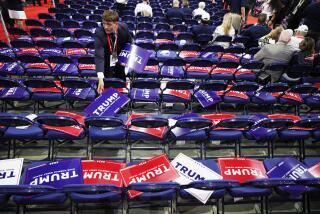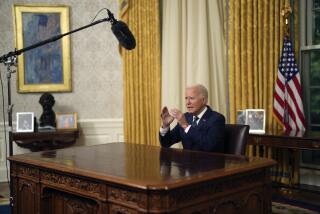Frustrated Clinton Fails to Divert Focus Off Perot Candidacy, Debates : Democrats: His criticism of Bush’s foreign policy falls on deaf ears, and his nerves show as he explodes over a GOP ad.
- Share via
MADISON, WIS. — Try as he might, Bill Clinton could not keep the defensiveness out of his campaign Thursday.
Vainly attempting to wrestle attention back to himself, the Democratic presidential nominee hammered President Bush on the incumbent’s perceived strength--foreign policy. But the effort was virtually lost in the tumult over whether in-and-out candidate Ross Perot would enter the race for the White House--he did--and the less dramatic fray over presidential debates.
Everywhere he went Thursday, Clinton was met with increasing evidence that, while he might be the front-runner, he does not necessarily garner the commensurate attention.
At campaign stops in both Madison and Milwaukee, Clinton was pelted with questions about Perot’s entrance into the race, which he dismissed with praise for his own economic plan and a blase attitude about the political complications the Texan could present.
“I’m just going to keep running the campaign I’ve been running all along, reaching out to the American people, going back to the grass roots, sticking up for America,” Clinton said. “It’s not going to change anything I do.”
The candidate later betrayed a bit more nervousness with a familiar Clinton trait: When times get tough, eat. En route from Milwaukee to a rally in Madison, he diverted his entourage off the interstate and into a fast-food establishment where he ordered a frozen yogurt.
“Perot gets back in and where’s the first place that we head?” one aide asked whimsically, recalling a precedent set during the tense New Hampshire primary campaign.
“Dairy Queen.”
Earlier in the day, in five interviews conducted with television stations across the country before Perot’s announcement, Clinton was peppered with inquiries about the businessman’s candidacy and the continuing negotiations over when candidate debates would be scheduled. Not one question was raised about his theme of the day.
In one of the interviews, Clinton displayed frustration, exploding in rage over a Bush campaign advertisement that contends the Arkansas governor would raise taxes on the middle class.
“It is a disgrace to the American people that the President of the United States would make a claim that is so baseless, so without foundation, so shameless in his attempt to get votes under false pretenses,” Clinton fumed in an interview with a New Orleans station.
Clinton said Thursday, as he has throughout his campaign, that his plan would increase taxes only on those making more than $200,000 per family. Clinton also has proposed a modest tax cut for the middle class--a group whose incomes he has not yet defined.
Terming the Bush commercial “blatantly false,” Clinton said: “George Bush has said time and again he would say whatever it takes to get elected President. His claim (in the ad) is totally without foundation. It is George Bush who raised taxes on the middle class after promising that he wouldn’t.”
The sense of defensiveness in Clinton’s campaign was also apparent in two television advertisements released Thursday--one defending his Arkansas record and another attacking Bush for raising taxes.
The second of the ads drew the candidates’ dispute over the tax issue full circle: Bush, in a commercial released last week, cited Clinton’s record of raising taxes in Arkansas. Noting that Clinton has promised to “invest” another $220 billion in domestic programs, the ad asked: “Guess where he’ll get the money?”
Clinton’s ad drew much the same conclusion about Bush’s history of raising taxes. It noted that Bush signed “the second biggest tax increase in American history” two years ago and said he wants “to give a $108,000 tax break to millionaires.”
“Guess who’s going to pay?” it asked.
During a speech in Milwaukee, Clinton reiterated criticisms on Bush’s foreign policy that both he and his running mate, Sen. Al Gore of Tennessee, previously have leveled against the President.
He flayed Bush for taking credit for the fall of communism and faulted him for not being able to simultaneously manage domestic and foreign affairs.
“Franklin Roosevelt . . . fought the Great Depression and the rise of fascism at the same time,” Clinton said. “Harry Truman carried out the Fair Deal at home . . . and at the same time moved to contain Communist aggression in Eastern Europe and Europe and Korea. They would have laughed, these presidents, at the idea of conducting foreign affairs in the first term and then switching to domestic affairs in the second.”
Clinton insisted he did not “mean to belittle President Bush’s accomplishments abroad,” specifically mentioning the international coalition the Administration put together to confront Iraqi leader Saddam Hussein.
But he said Bush had consistently sided with stability--maintaining the superiority of those in power--rather than siding with pro-democracy groups within various nations. As he has in the past, Clinton strongly chided Bush for what he called an “indifference to democracy” in his policy toward China.
Much of Clinton’s presentation seemed to be an attempt to display a moderate view toward world affairs and conflicts. At one point he went out of his way to say U.S. actions should be guided by “prudence and common sense”; twice he suggested he would not hesitate to defend the country’s interests.
“There will always be those in the world who pursue their goals through force and violence,” he said. “They should know that a Clinton Administration will maintain the military strength we need to defend our people, our vital interests and our values.”
More to Read
Get the L.A. Times Politics newsletter
Deeply reported insights into legislation, politics and policy from Sacramento, Washington and beyond. In your inbox twice per week.
You may occasionally receive promotional content from the Los Angeles Times.











